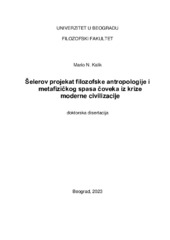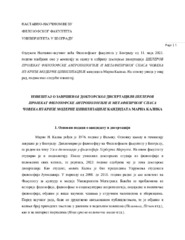Приказ основних података о дисертацији
Šelerov projekat filozofske antropologije i metafizičkog spasa čoveka iz krize moderne civilizacije
Scheler's project of philosophical anthropology and metaphysical salvation of man from the crisis of modern civilization
| dc.contributor.advisor | Govedarica, Milanko | |
| dc.contributor.other | Grubor, Nebojša | |
| dc.contributor.other | Dobrijević, Aleksandar | |
| dc.contributor.other | Petrović, Predrag | |
| dc.creator | Kalik, Mario | |
| dc.date.accessioned | 2024-03-13T15:48:13Z | |
| dc.date.available | 2024-03-13T15:48:13Z | |
| dc.date.issued | 2023-07-13 | |
| dc.identifier.uri | https://uvidok.rcub.bg.ac.rs/doccall/bitstream/handle/123456789/5348/Referat.pdf | |
| dc.identifier.uri | https://eteze.bg.ac.rs/application/showtheses?thesesId=9565 | |
| dc.identifier.uri | https://fedorabg.bg.ac.rs/fedora/get/o:33000/bdef:Content/download | |
| dc.identifier.uri | https://plus.cobiss.net/cobiss/sr/sr/bib/138985225 | |
| dc.identifier.uri | https://nardus.mpn.gov.rs/handle/123456789/22309 | |
| dc.description.abstract | Po Šelerovom mišljenju, temelj krize moderne civilizacije nalazi se u specifičnom poimanju čoveka, odnosno jednoj antropologiji, koja se razvija sa modernim dobom i društvom, i koja dostiže vrhunac u savremenosti. Reč je o shvatanju čoveka kao „homo fabera“, bića čije je glavno određenje da proizvodi oruđa, koncepciji koja takođe ne razlikuje čoveka suštinski od životinje. Ovakvoj antropologiji odgovara dominacija „gospodarujućeg“ i „proizvodnog“ (učinkovitog) znanja u svetu života, koje se odnosi na egzaktnu prirodnu nauku i tehniku, i što intenzivniji naučno-tehničko-tehnološki razvoj. Moderan čovek i njegova civilizacija ne znaju za više, eminentno duhovne vrednosti istinitog, pravednog, lepog, i najvišu vrednost svetog, ili su ove vrednosti u njoj sasvim podređene i skrajnute. Ona se, sledstveno tome, zatvara pred višim oblicima znanja kao što su religija, „prva filozofija“ i/ili metafizika. Ovakav poredak vrednosti moderne civilizacije vezan je, u krajnjem, za njeno poreklo u okrilju buržoazije kao društvene klase kod koje je materijalno privređivanje bazična društvena delatnost. Budući da je temeljni uzrok krize modernog sveta iskrivljena slika čoveka kao „homo fabera“, rešenje za ovu krizu i spas čoveka iz „varvarstva“ moderne civilizacije može biti jedino u izgradnji novog pogleda na čoveka, tj. nove filozofske antropologije. Šeler razvija svoju filozofsku antropologiju kao nužnu pretpostavku i pripremu za metafiziku (apsoluta), zamišljenu kao „znanje spasenja“ (Heilswissen) koje treba da izbavi čoveka iz krize moderne civilizacije. Čovek se spasava posredstvom metafizike, tako što stupa u jedinstvo sa apsolutnim (božanskim) i saučestvuje u njegovom ostvarenju. Oslanjajući se na problemsko-egzegetski i kritičko-društveni metod istraživanja, u radu je pokazano da se Šelerova filozofija i filozofska antropologija suočavaju sa više temeljnih i posebnih problema. Ona nije suštinski prevazišla dotadašnje preovlađajuće idealističko i/ili teološko poimanje čoveka u istoriji filozofije, jer vidi suštinu čoveka u duhu. Takođe, čitav Šelerov metafizički projekat kao alternativa modernoj civilizaciji i osnova za spas čoveka pokazuje se kao teško ostvariv, pogrešan, pa i promašen. Njegovo vezivanje sudbine i „spasa“ čoveka za božansko, makar u kasnije promenjenoj ulozi čoveka kao ravnopravnog „prijatelja“ božanskog u njegovom ostvarenju, ostaje u okviru teološke koncepcije koja ne može da razume čoveka i smisao njegovog postojanja mimo instance božanskog. Umesto da duh „homo fabera“ i njegov poredak vrednosti i oblika znanja nastavi da dosledno tumači i kritikuje kao ideološki izraz klasnih interesa buržoazije, on apstrahuje duh te klase od njenih društveno-klasnih osnova. I predlaže duhovnu borbu protiv ovog „preokreta vrednosti“, u kojoj metafizika kao „spasonosno“ znanje ima presudnu ulogu. Međutim, ovakva čisto duhovna borba teško može da otkloni uzroke krize onda kada oni leže izvan (i ispod) duha. Imajuću u vidu Šelerove konkretne društveno-ideološke stavove, može se reći da njegova filozofska antropologija i filozofija u celini predstavljaju specifičnu teorijsku ideologiju (idealističko-metafizičku i teološku) koja, posredno ili neposredno, legitimiše jednu posebnu društvenu ideologiju (elitističku, u njenoj konzervativnoj ili liberalnoj varijanti), i time, u krajnjoj instanci, služi interesima određenih društvenih klasa, odnosno staleža (aristokratije, sveštenstva ili liberalne inteligencije i buržoazije). Na kraju rada navedena je (neo)marksistička kritička analiza Šelerove i uopšte tadašnje metafizike, filozofske antropologije i teoloških motiva u filozofskom mišljenju, data u radovima Lukača i predstavnika Frankfurtske škole Horkhajmera, Adorna, Markuzea i Habermasa. Mislimo da Šeler, s jedne, i (neo)marksisti, s druge strane, reflektuju istu istorijsko-društvenu situaciju i krizu modernog društva i znanja, pa čak imaju i brojne istovetne uvide i formulacije, ali da su objašnjenja krajnjih uzroka ove krize, pa samim tim i za nju adekvatn(ij)a rešenja, uverljivije pokazana u okviru Kritičke teorije društva kojoj navedeni mislioci pripadaju. Ipak, kod poznog Horkhajmera, i delimično Habermasa, dolazi do izvesnog zbližavanja sa Šelerovom kasnom pozicijom u nekim aspektima, što otvara prostor za dalja istraživanja odnosa Šelerove i misli frankfurtskih filozofa. | sr |
| dc.description.abstract | In Scheller's opinion, the foundation of the crisis of modern civilization is in a specific understanding of man, that is, an anthropology, which develops with the modern age and society, and which reaches its peak in modern times. It is about understanding man as "homo faber", a being whose main purpose is to produce tools, a conception that also does not fundamentally distinguish man from animal. This kind of anthropology corresponds to the superiority of "dominant" and "productive" (effective) knowledge in the lifeworld, which refers to exact natural science and technology, and the most intensive scientific-technical-technological development. Modern man and his civilization do not know about the higher, eminently spiritual values of the true, the just, the beautiful, and the highest value of the holy, or these values are completely subordinated and marginalized in it. Consequently, it closes itself to higher forms of knowledge such as religion, „first philosophy“ and/or metaphysics. This order of values of modern civilization is ultimately related to its origin in the auspices of the bourgeoisie as a social class where material economy is the basic social activity. Since the fundamental cause of the crisis of the modern world is the distorted image of man as "homo faber", the solution to this crisis and the salvation of man from the "barbarism" of modern civilization can only be in the construction of a new view of man, i.e. new philosophical anthropology. Scheler develops his philosophical anthropology as a necessary presupposition and preparation for metaphysics (of the absolute), conceived as „knowledge of salvation“ (Heilswissen) that should rescue man from the crisis of modern civilization. Man is saved through metaphysics, by entering into unity with the absolute (divine) and participating in its realization. Relying on the problem-exegetical and critical-social research method, the paper shows that Scheler's philosophy and philosophical anthropology face several fundamental and special problems. It did not fundamentally overcome the previously prevailing idealistic and/or theological conception of man in the history of philosophy, because it sees the essence of man in the spirit. Also, Scheler's entire metaphysical project as an alternative to modern civilization and the basis for the salvation of man proves to be difficult to achieve, wrong, and even failed. His tying of the destiny and "salvation" of man to the divine, even in the later changed role of man as an equal "friend" of the divine in its realization, remains within the framework of a theological conception that cannot understand man and the meaning of his existence beyond the instance of the divine. Instead of continuing to consistently interpret and criticize the spirit of "homo faber" and its order of values and forms of knowledge as an ideological expression of the class interests of the bourgeoisie, he abstracts the spirit of that class from its social-class foundations. And he proposes a spiritual struggle against this "reversal of values", in which metaphysics as knowledge of „salvation“ plays a crucial role. However, this kind of purely spiritual struggle can hardly remove the causes of the crisis when they lie outside (and below) the spirit. Bearing in mind Scheler's concrete socio-ideological views, it can be said that his philosophical anthropology and philosophy as a whole represent a specific theoretical ideology (idealistic-metaphysical and theological) which, indirectly or directly, legitimizes a particular social ideology (elitist, in its conservative or liberal variant), and thus, in the last resort, serves the interests of certain social classes, i.e. estates (aristocracy, clergy or liberal intelligentsia and bourgeoisie). At the end of the paper, a (neo)Marxist critical analysis of Scheler's metaphysics and philosophical anthropology in general, given in the works of Lukács and Frankfurt School representatives Horkheimer, Adorno, Marcuse and Habermas, is given. We think that Scheler, on the one hand, and (neo)Marxists, on the other hand, reflect the same historical-social situation and crisis of modern society and knowledge, and even have numerous identical insights and formulations, but that the explanations of the ultimate causes of this crisis, so therefore, there are adequate solutions for it, more convincingly demonstrated within the framework of the Critical Theory of Society to which the above thinkers belong. Nevertheless, in the late Horkheimer, and partly in Habermas, there is a certain rapprochement with Scheler's late position in some aspects, which opens up space for further research into the relationship between Scheler's and the thoughts of the Frankfurt philosophers. | en |
| dc.format | application/pdf | |
| dc.language | sr | |
| dc.publisher | Универзитет у Београду, Филозофски факултет | sr |
| dc.rights | openAccess | en |
| dc.source | Универзитет у Београду | sr |
| dc.subject | moderna civilizacija, kriza, filozofska antropologija, metafizika, teologija, spasenje, „homo faber“, vrednosti, ljubav, dominacija, duh | sr |
| dc.subject | modern civilization, crisis, philosophical anthropology, metaphysics, theology, salvation, "homo faber", values, love, domination, spirit | en |
| dc.title | Šelerov projekat filozofske antropologije i metafizičkog spasa čoveka iz krize moderne civilizacije | sr |
| dc.title.alternative | Scheler's project of philosophical anthropology and metaphysical salvation of man from the crisis of modern civilization | en |
| dc.type | doctoralThesis | |
| dc.rights.license | ARR | |
| dc.identifier.fulltext | http://nardus.mpn.gov.rs/bitstream/id/159942/Disertacija_15151.pdf | |
| dc.identifier.fulltext | http://nardus.mpn.gov.rs/bitstream/id/159943/Izvestaj_Komisije_15151.pdf | |
| dc.identifier.rcub | https://hdl.handle.net/21.15107/rcub_nardus_22309 |



